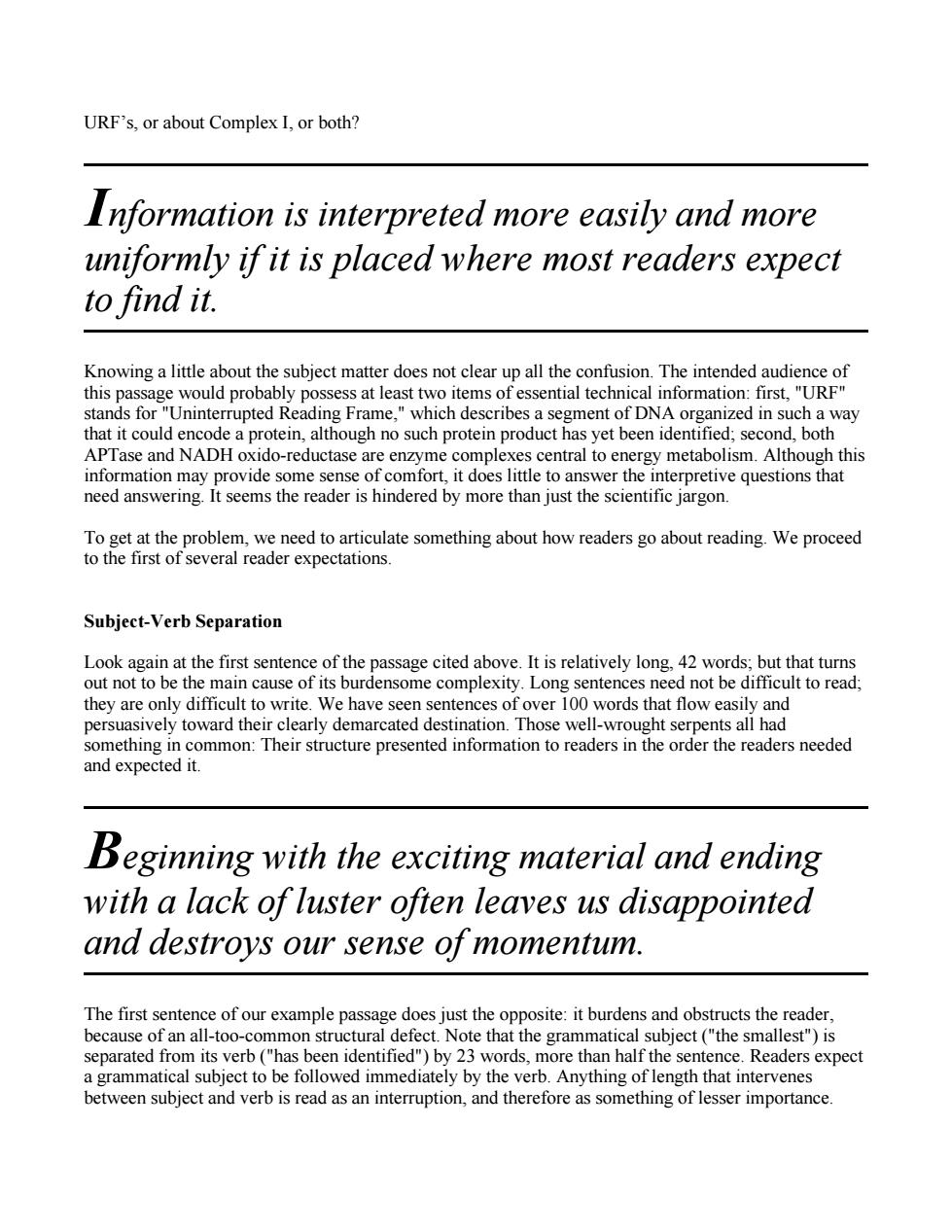正在加载图片...

URF's,or about Complex I,or both? Information is interpreted more easily and more uniformly if it is placed where most readers expect to find it. Knowing a little about the subject matter does not clear up all the confusion.The intended audience of this passage would probably possess at least two items of essential technical information:first,"URF" stands for "Uninterrupted Reading Frame,which describes a segment of DNA organized in such a way that it could encode a protein,although no such protein product has yet been identified;second,both APTase and NADH oxido-reductase are enzyme complexes central to energy metabolism.Although this information may provide some sense of comfort,it does little to answer the interpretive questions that need answering.It seems the reader is hindered by more than just the scientific jargon. To get at the problem,we need to articulate something about how readers go about reading.We proceed to the first of several reader expectations. Subject-Verb Separation Look again at the first sentence of the passage cited above.It is relatively long,42 words;but that turns out not to be the main cause of its burdensome complexity.Long sentences need not be difficult to read; they are only difficult to write.We have seen sentences of over 100 words that flow easily and persuasively toward their clearly demarcated destination.Those well-wrought serpents all had something in common:Their structure presented information to readers in the order the readers needed and expected it. Beginning with the exciting material and ending with a lack of luster often leaves us disappointed and destroys our sense of momentum. The first sentence of our example passage does just the opposite:it burdens and obstructs the reader, because of an all-too-common structural defect.Note that the grammatical subject("the smallest")is separated from its verb("has been identified")by 23 words,more than half the sentence.Readers expect a grammatical subject to be followed immediately by the verb.Anything of length that intervenes between subject and verb is read as an interruption,and therefore as something of lesser importance.URF’s, or about Complex I, or both? Information is interpreted more easily and more uniformly if it is placed where most readers expect to find it. Knowing a little about the subject matter does not clear up all the confusion. The intended audience of this passage would probably possess at least two items of essential technical information: first, "URF" stands for "Uninterrupted Reading Frame," which describes a segment of DNA organized in such a way that it could encode a protein, although no such protein product has yet been identified; second, both APTase and NADH oxido-reductase are enzyme complexes central to energy metabolism. Although this information may provide some sense of comfort, it does little to answer the interpretive questions that need answering. It seems the reader is hindered by more than just the scientific jargon. To get at the problem, we need to articulate something about how readers go about reading. We proceed to the first of several reader expectations. Subject-Verb Separation Look again at the first sentence of the passage cited above. It is relatively long, 42 words; but that turns out not to be the main cause of its burdensome complexity. Long sentences need not be difficult to read; they are only difficult to write. We have seen sentences of over 100 words that flow easily and persuasively toward their clearly demarcated destination. Those well-wrought serpents all had something in common: Their structure presented information to readers in the order the readers needed and expected it. Beginning with the exciting material and ending with a lack of luster often leaves us disappointed and destroys our sense of momentum. The first sentence of our example passage does just the opposite: it burdens and obstructs the reader, because of an all-too-common structural defect. Note that the grammatical subject ("the smallest") is separated from its verb ("has been identified") by 23 words, more than half the sentence. Readers expect a grammatical subject to be followed immediately by the verb. Anything of length that intervenes between subject and verb is read as an interruption, and therefore as something of lesser importance